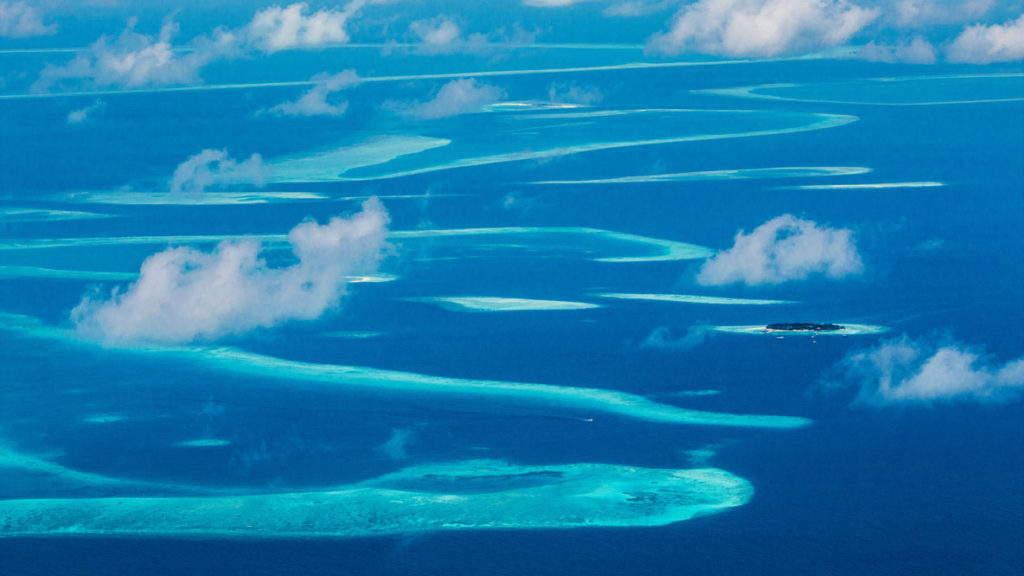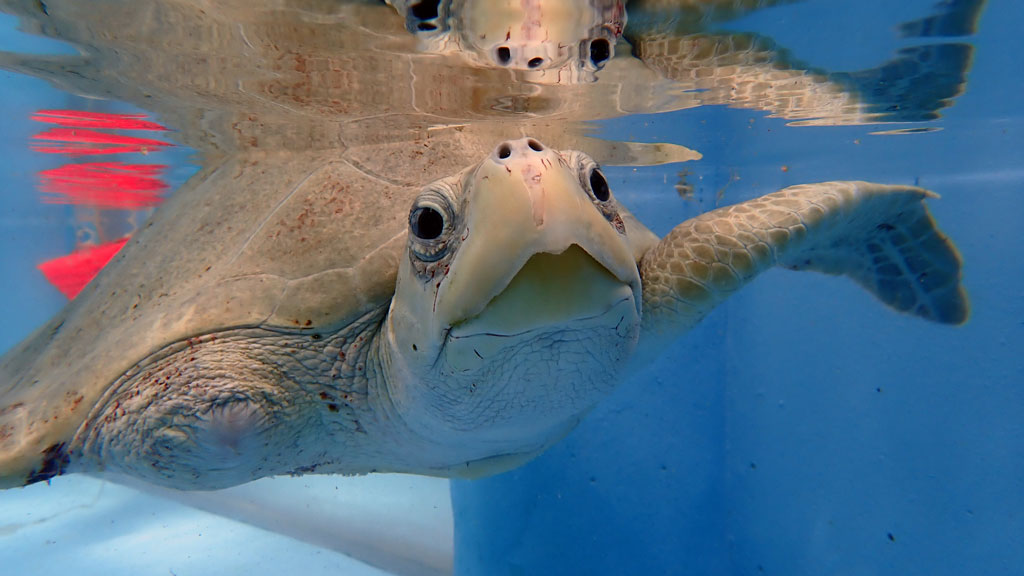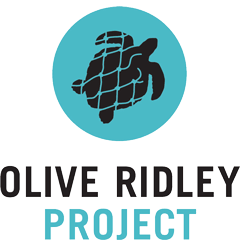ORP’s Veterinary Training Programme offers a unique opportunity for veterinary surgeons working with exotics or wildlife to train in sea turtle medicine in a teaching hospital environment. The Marine Turtle Rescue Centre in Baa Atoll Maldives is also one of the few places in the world where olive ridley turtles are seen in a clinical setting.
The ORP veterinary team has nearly 25 years of collective sea turtle medicine experience. Combined, our Lead Veterinary Surgeon, Veterinary Surgeon, Associate Veterinary Surgeon and consulting Veterinary Programme Officer, form the largest and most experienced sea turtle veterinary team in the region.
We also welcome the opportunity for you to share your already existing skills and knowledge with our team. By sharing ideas and knowledge, this programme enhances the advancement and improvement of sea turtle veterinary care here at ORP and at other centres around the world.
About Maldives & Baa Atoll

The Republic of Maldives is a nation of coral islands situated in the Indian Ocean. The country spans roughly 90,000 square kilometres divided into twenty-six atolls with approximately 1190 islands. It is the smallest Asian country by both land area and population (with just fewer than 400,000 people!). Maldives is famous for its sandy white beaches, crystal clear turquoise waters, beautiful coral reefs and colourful marine life. It truly is magical, both over and under water.
The ORP Marine Turtle Rescue Center is located on Dhuni Kolhu island in Baa Atoll, a 30-minute sea plane ride north of Malé, the capital of the Maldives. Baa Atoll consists of 75 islands, only 13 of which are inhabited. 13 additional islands are operated as island resorts. Baa Atoll is rich in biodiversity with plenty of sea turtles, manta rays, hard and soft coral, and a huge variety of reef fish species.
About ORP
The Olive Ridley Project (UK registered charity No. 1165905, Maldives CR/04/2022) was established in 2013 to actively fight ghost gear in the Indian Ocean. Since then, we have expanded our mission to take a multifaceted and holistic approach to protecting sea turtles and their habitats. We do this through rescue and rehabilitation, scientific research, and education and outreach.
We operate a Marine Turtle Rescue Centre and three Sea Turtle Rehabilitation Centres in the Maldives, and run one of the largest sea turtle Photo-ID databases in the world. We have team members stationed in 7 atolls in the Maldives as well as in Oman, Kenya, Seychelles and Pakistan. You can meet the team here and read more about the Olive Ridley Project here.
About the Marine Turtle Rescue Centre
The ORP Marine Turtle Rescue Centre opened in February 2017 in collaboration with Coco Collection at Coco Palm Dhuni Kolhu in Baa Atoll. It is a unique centre in the Maldives because we employ a full-time Resident Veterinary team! Interns and volunteers assist our veterinary surgeon and veterinary nurse in the daily operations at the centre.
Most of our turtle patients are ghost gear and marine debris entangled victims. We also have patients who have been found floating, sick, injured by fishing hooks and blunt force trauma, and some that we suspect have been kept as pets. Olive ridley turtles make up the biggest patient numbers.
About The Clinic
The clinic at the Marine Turtle Rescue Centre is the most advanced sea turtle medical facility in the Maldives and functions as a teaching hospital. It is equipped with:
- A full diagnostic and blood laboratory
- Pharmacy
- Microscope
- Class-4 therapeutic laser
- Ultrasound
- Endocsope
- Digital radiography system
- A full surgical suite
We are able to triage and treat any injury or condition faced by sea turtles in Maldivian waters. We also serve as an expert resource for other rescue centres in the country and region, as well as for the Maldivian government.
About The Patient Tanks
There are seven patient tanks in the Marine Turtle Rescue Centre. The tanks can be considered analogous to a patient bed in a human hospital. This is where our patients spend most of their time while under our care.
The patient tanks are divided into staging areas based on the specific condition or procedure being performed. This includes smaller tanks for critical patients requiring more specialised care and observation to larger tanks for patients nearing release to the wild.
Adjacent to the tanks is our outdoor procedure area, where we perform minor procedures, examinations, therapies, and patient hygiene.
About The Training Experience
The Rescue Centre is a very busy facility. Our patient census can vary widely based on many factors, including weather patterns, seasonality and patient capacity. A typical day will include:
- Rounding on patients with the on-site team
- Preparing and administering diets
- Performing routine elective procedures like blood draws, CBCs and clinical chemistry evaluations physical exams, diagnostic imaging, photobiomodulation therapy, acupuncture and wound care
Once or twice weekly, we hold grand rounds with the on-site team and the lead veterinary surgeon. This is when we discuss complicated cases and specific aspects of sea turtle medicine.
More complex procedures are often done on a semi-elective basis. These include surgery, centeses, deep wound debridements, endoscopic and contrast studies, and regenerative medicine therapy. Since we function as a 24/7 facility, emergency admissions may occur at any time.
Clinical research is an important component of our mission. We have several projects ongoing at any given time at the Centre, providing ample opportunities to get involved in our research. Indeed, we encourage our visiting veterinarians to actively participate in these efforts.
About The Veterinary Training Program
The Veterinary Training Programme runs from April to October. We welcome visiting veterinary surgeons to join us for three weeks of intensive training, combining clinical skill development with didactic instruction.
Our programme’s primary mission is to train clinicians from countries where sea turtle medicine is the primary clinical practice, with a special focus on training veterinary surgeons from our neighboring countries. We are committed to providing this training without charge, acknowledging the challenges associated with specialised veterinary training for clinicians from developing countries.
To provide this resource, we require a modest fee from veterinary surgeons from developed countries to support the training of veterinary surgeons from developing countries. The fee for 2024 is £1,700 for three weeks, not including return domestic and international flights.
Testimonials

“My three weeks working with the Olive Ridley Project was an unforgettable once-in-a-lifetime experience. It helped me cement my knowledge of sea turtle medicine and surgery but more importantly I learned about the practical aspects of running a rescue centre in a remote setting. Eventually, I hope to use these skills to help save sea turtles back in Mauritius.
Although we don’t often get Olive Ridley turtles, other species such as the hawksbill and green sea turtles are commonly in rescued in Mauritian
– Dr Shiva, Mauritius
waters.”

“In May 2022 I joined the ORP team at their rescue and rehabilitation centre, as part of my dissertation project in conservation medicine. During my time I was able to be actively involved with the care of inpatients, helping to triage new cases and getting hands-on experience of sea turtle medicine. It was a true privilege to work with such an incredible species. The ORP team were welcoming, supportive and fantastic to work with, and in our down time we were able to explore the waters around the island, snorkeling and scuba diving. I would thoroughly recommend visiting the ORP rescue centre, and hope to return in the future.”
– Dr Claire, UK

“As I landed on the island, the team made sure I got the best experience and exposure to sea turtle medicine. From experiencing live sea turtle nesting to the relocation of the nest, clinical health evaluation, diagnostics, blood collection, nutrition, husbandry, anaesthesia, and surgery. I got a chance to meet and work with professionals from various backgrounds and we became a good team.
During our free time, we got to explore the island, go snorkeling, dive and just enjoy the island life. Overall my experience was excellent, an opportunity for personal and professional growth.”
– Dr Neha, India

“Working with the Olive Ridley Project is an experience I will never forget. I was impeccably cared for and left with a sense of great accomplishment having worked closely with many of the fantastic animals and their very dedicated veterinary team. I had the opportunity to put my clinical skills as an exotic veterinary surgeon into practice in a species that I would otherwise never get to see, let alone work closely with.”
– Dr Sonya, UK
How To Apply For The Veterinary Training Programme
We will be accepting candidate applications for 2026 in mid-2025. Watch this space for further updates.









